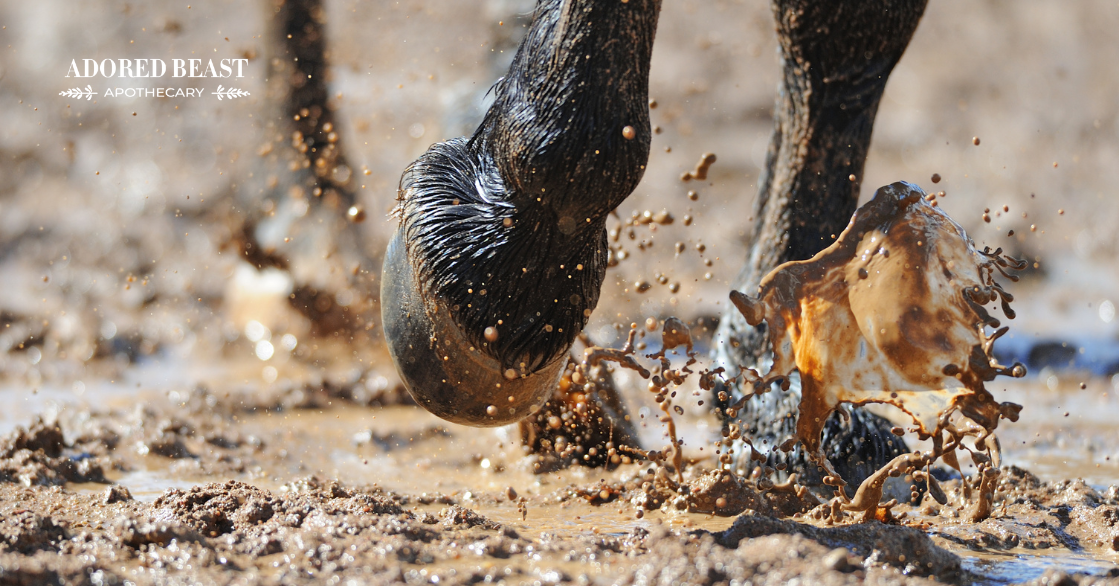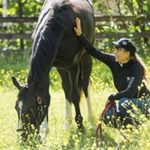We’ve had a warm summer and it’s hard to believe fall is right around the corner! With fall, often comes rain, especially here where I live on the west coast. The wet conditions bring challenges for horses’ feet, making them softer and more susceptible to bacterial and fungal infections, including thrush. These types of infections can greatly affect the integrity of the hoof so it’s best to prevent it whenever possible.
Today’s blog is about the prevention and management of thrush in horses from a whole-horse perspective.
What is Thrush in Horses?
Thrush in horses is a confusing infection because it doesn’t always involve just one type of microbe. It has been associated with a type of yeast known as Candida albicans and it’s also linked to a bacteria called Fusobacterium necrophorum. There are other bacteria and fungi that can be involved too so it’s actually a microbial imbalance within the hoof tissue. The hoof microbes can become imbalanced due to a change in pH (often caused by standing in urine), excessive moisture and individual susceptibility which can be related to breed, age, diet, and health status.
Which horses are most affected?
These horses are at the highest risk for developing thrush:
- Horses with poor body condition
- Those kept in filthy stall or paddock conditions
- Horses with wet or muddy footing
- Those horses with compromised immune systems (eg. senior horses and horses with health problems)
- Irregular or poor farrier work can also leave the hoof compromised and susceptible to disease.
How Can Thrush be Prevented?
Thankfully, there are things that we can control when it comes to thrush in horses. The most important preventatives to keep thrush out of your horse’s life are:
- Keep footing in all stall and turnout areas very clean and dry. This may involve picking manure and urine several times a day. A horse should never be standing in urine, manure, or mud.
- Eliminate dietary starch since Candida thrives in animals that are eating a starchy diet.
- Eliminate all processed feeds that contain the herbicide glyphosate (which can disrupt the integrity of the hoof tissue). This means excluding molasses, extruded grains and legumes of any kind, sugar beets (unless they are non-GMO), wheat, corn, soy, and alfalfa (unless it is guaranteed not to be sprayed).
- Keep regular appointments with your farrier to ensure the hoof is shaped correctly for healthy circulation to the hoof. Healthy circulation = healthy oxygenation of the hoof tissues leaving anaerobic bacteria (eg. bacteria that thrives in low-oxygen environments) from being able to thrive.
Senior horses may have more trouble with fighting off bacterial infections so immune/gut support through supplementation is warranted. Consider including:
- Prebiotics (eg. a variety of herbs and healthy dietary fibres) – this supports the gut microbiome as well as regulating blood sugar – both important aspects of healthy hooves.
- Probiotics – offering as many strains as possible can help diversify the microbiome, strengthening the immune system and the gut. To learn more about the gut/hoof connection, read my blog here.
- Minerals – consider exploring what your horse might be lacking in the mineral department via a blood test with your veterinarian. Common mineral deficiencies that can affect the hoof are: selenium, magnesium, and zinc. Ditch any industrial salt blocks and switch to naturally occurring salt instead. Calcium is another mineral that is often deficient in the equine diet. It’s important to review whether or not your horse is getting enough calcium not only for healthy hooves but also for the entire musculoskeletal and nervous systems.
- Vitamins – consider adding a B vitamin complex including biotin (B7) and vitamin E which can help strengthen the hoof tissues and support the immune system. Many senior horses benefit from the addition of these vitamins.
- Liver Support – the liver is the largest filter of the body and when it gets overwhelmed, toxins can build up in tissues all around the body. This can affect and alter hoof growth. Be sure to provide your horse with a liver support supplement twice a year regardless of whether or not they have had thrush. Herbs for liver support include dandelion, milk thistle, greater celandine and barberry.
Managing Thrush
If your horse has had thrush in the past, they are more susceptible to have it recur. This happens when the tissue of the hoof is compromised. Even during the dry season, there may be small amounts of thrush-causing bacteria/fungi waiting for the right conditions to return (eg. wet fall weather).
In preparation for the rainy season, here are some tips to consider if your horse develops thrush:
- Consider having your horse’s feet trimmed more often to remove affected tissue from the hoof regularly
- Ensure that their living conditions do not promote bacterial growth so eliminating urine, manure, mud, and puddles is essential
- Use a topical hoof care product that provides a moisture barrier while nourishing the hoof and preventing bacteria from thriving. My favorite one is here.
- Use a 50/50 water and hydrogen peroxide mixture to soak hooves for 15-20 minutes daily. Once soaked, put the horse in a dry stall with clean bedding and allow the feet to completely dry. Then apply a moisture barrier before the horse is turned out again if the weather is wet.
- Increasing your horse’s mobility through low-impact movements (eg. walking) helps increase circulation and oxygenation to the hoof. This makes it more difficult anaerobic bacteria from being able to grow.
- Chemical thrush treatments should be used with caution since they can actually make the problem worse over time if a long term plan isn’t established. If the situation is severe, chemical treatment may be warranted but also have a long term preventative plan so that you don’t have to keep repeating the chemical treatments. My tips above can be used even if chemicals need to be applied initially.












